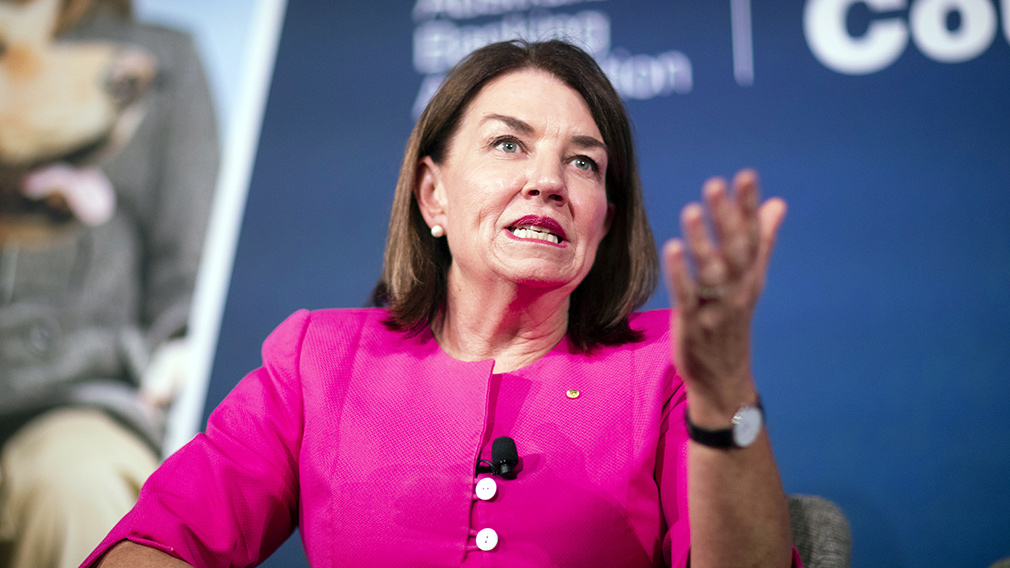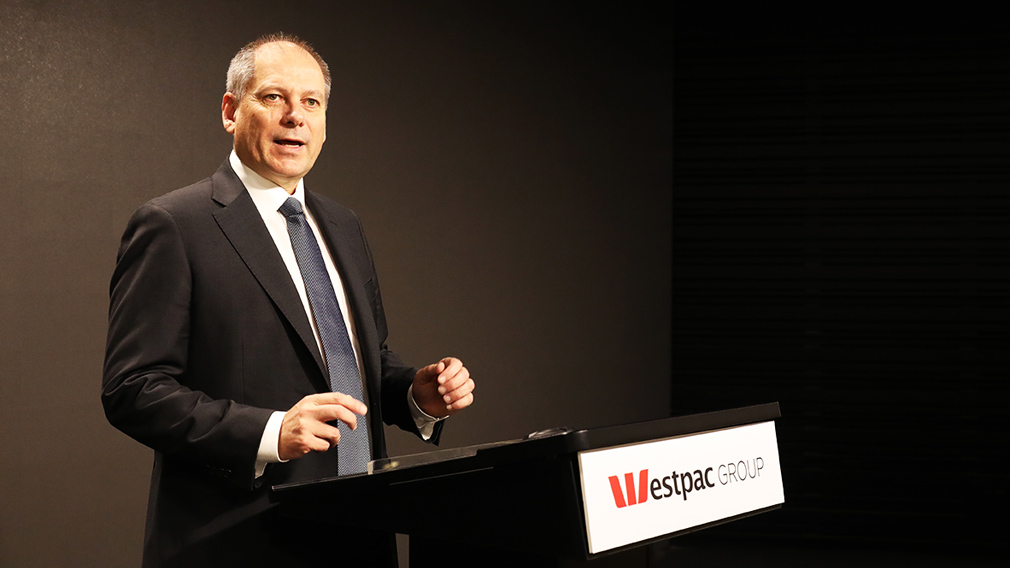‘Good start, but more to do on trust rebuild’

Anna Bligh, CEO of the Australian Banking Association, speaks at an event in January. (Getty)
Banks have made a “good start” in rebuilding trust and repairing the industry’s battered reputation after supporting hundreds of thousands of customers during the COVID-19 pandemic, but there’s a “long way to go” and the next few years will be critical to community perceptions.
That’s the view of Anna Bligh, the chief of the Australian Banking Association, who is no stranger to a crisis, having led Queensland through the devastating 2011 floods as state Premier.
Speaking at a Westpac event last week, she said the images of lines of Australians queuing outside Centrelinks in March with COVID-19 spreading fast and lockdowns looming was when it hit her “how big this was going to be”. But like all crises, she said it provided an opportunity for banks to refocus on their core purpose and rightly put into action a “lot of the words that were said after the royal commission” to support customers through the pandemic, working effectively with government and regulators on the nation’s response.
“They (banks) came into this crisis extremely well capitalised, strong balance sheets, more so than the industry has ever gone into any crisis, so they had the financial firepower to act as shock absorbers” she said. “But having that capability is only half the equation…you have to be willing to use it.”
Six months on, Ms Bligh said while sentiment towards the industry had improved following key support measures such as loan repayment deferrals, it was off a low base and the reality was “reputation arrives on a tortoise and leaves on a galloping horse”. She said how the industry dealt with customers in the difficult periods ahead would be key to the industry’s trust and reputation, and there's "still a long way to go".
“I would describe it as quite fragile. In order to really embed it, it's going to be just as dependent on what happens in the next six months and the one after that and the one after that,” she said.
“Think about the people in your life that you trust. They’re people who you can rely on to behave in the right way towards you consistently, reliably, day after day. So, we can't win it back in six months, but it’s a good start and now we've got to really lock it in.
“But, of course, this thing has got a long way to play out.”
The comments come at an important point in the COVID-19 crisis, as banks engage with customers on $229 billion of loan deferrals (as at August 31) and some of the government’s initial support measures, such as the JobKeeper wage subsidy payments, are reduced.
Ahead of Tuesday’s highly anticipated federal budget, Treasurer Josh Frydenberg last week however made a series of fresh announcements aimed at further supporting businesses and the economy, including plans to remove responsible lending obligations from the National Consumer Credit Protection Act 2009 (except for some higher risk products).
The move was backed by the banks, Westpac chief Peter King saying the proposed changes would reduce red tape for consumers seeking a loan, speed up the approval process and assist small businesses, which “drive employment and…is very important for economic recovery”. He added it was in the bank’s interest to only lend to customers who can meet their financial obligations and the government’s proposal “strikes a good balance between reducing regulatory burden on credit providers while ensuring we have rigorous credit processes in place”.
Despite some pushback from consumer groups to the proposed changes, Ms Bligh told the Westpac event that suggestions the provision of credit would be “completely deregulated” were false. She said regulatory oversight over lending would remain strong and the government was trying to simplify the framework by giving one regulator, APRA, clear responsibility for responsible lending obligations and clearing up any confusion or caution arising from “pages and pages of guidance” which aren’t always in sync.
She added that while bankers would face some “pretty hard” decisions in the next six months, banks would still be required to abide by the law.
“I think what the government's trying to do is actually to encourage appropriate risk taking. If banks never took a punt on someone, some of our most successful businesses would never be where they are today,” she said.
“And, you know, laws did not protect banks ultimately from the scrutiny and criticism of the royal commission. What will protect the banks is doing the right thing every single time – you can only behave your way out of a problem that you behaved your way into.”
Reflecting on COVID-19 straight after the horrific bushfires, Ms Bligh said it was clear right from the start in March that the banks were on board “Team Australia”. She added that while banks have "incredibly good" track records responding to crises like natural disasters with support packages, COVID-19 was unique in that the entire nation was fearful for their health and jobs, and ABA members agreed to go out with strong, simple industry responses to the unfolding situation, even if that meant slightly delaying the announcement of their own measures.
“Some of the first couple of weeks where we were announcing initiative after initiative and getting all of those CEOs together and sometimes we were meeting every night for hours and then bringing in APRA, I felt really proud,” she recalled.
“For me, that was a really memorable period and I think it is the most concrete demonstration I have seen, and I think that the whole of the country has seen, that this industry means what it says, that it's learnt some of those lessons from the past and it's determined to meet the expectations of the community.”
So, fresh from her latest crisis, what are Bligh’s tips for responding to one?
She said while all are different, there are many similarities. One is having to make “very high stakes decisions in very suboptimal environments”, particularly the lack of information and time.
“You have to be prepared to take responsibility for making the call and to take responsibility for the consequences of the call…and convey to your team that you're going to take that responsibility” so it’s clear they won’t be blamed if it goes wrong, she said.
“That's not always easy to get right,” she said.
A challenge with COVID-19 has also been having teams working remotely, she added.
“And every crisis I've ever been through reinforces to me again and again and again how important recruitment is, because it's only when everything goes terribly wrong that you really get to see whether you've put the right people around you,” she said.
Finally, Bligh said in a crisis making sure teams know leaders have their backs is critical, as well as striking the balance between “authoritative command and control style leadership” and the more “inclusive, empathetic and consultative” type of leadership.
“In my experience, at the very peak of a crisis, people want a lot more of the authority. They want to know what I know. Do I have to leave my house? When is the bridge going to close? What is the government going to do about JobKeeper? Etc.
“But nevertheless, you always have to remember that most of the time people in these circumstances are very frightened. They're in unknown circumstances and they need comfort.”
Westpac's COVID-19 Customer Support information can be found here.


